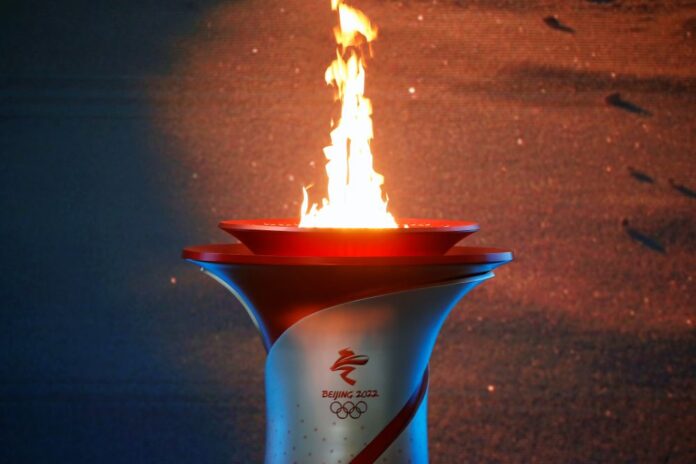The Olympic flame burns in a cauldron at the ceremony to welcome the flame for the Beijing 2022 Winter Olympics, in Beijing October 20, 2021. — Reuters pic
BEIJING, Oct 20 — The Olympic flame arrived in Beijing on Wednesday for the 2022 Winter Games following a ceremony in Greece overshadowed by protests over China’s human rights record.
Beijing — set in February to become the first host of a Summer and Winter Games — held a welcome event for the flame at the capital’s Olympic Tower, where it will go on display.
A short torch relay in early February consisting of 1,200 torchbearers will carry the flame around the three Olympic competition zones, organisers said.
With the Games just over 100 days away, the flame was carried off a plane in a red lantern and then welcomed by a children’s choir before being transferred to a cauldron by the city’s Communist Party secretary Cai Qi.
The flame will be displayed at the Olympic Tower near the “Bird’s Nest” Stadium, which hosted the opening ceremony for the 2008 Games and will be used for the opening and closing ceremonies in February.
Audiences for the torch relay will be limited to minimise Covid-19 risks, with people encouraged instead to follow online using augmented and virtual reality software, state-run Beijing Daily reported.
The flame was lit in Olympia on Monday and transferred the following day to the organisers of the Beijing Games.
The low-key event was held in front of a limited audience because of the coronavirus and, in a break with tradition, there was no torch relay on Greek soil.
Rights campaigners accuse the International Olympic Committee of turning a blind eye to what they say is a litany of abuses in China, notably over Tibet, its treatment of Muslim minorities in Xinjiang and its clampdown in Hong Kong.
Activists grabbed the spotlight at Monday’s lighting ceremony, unfurling a Tibetan flag and a banner that read “no genocide” before Greek police intervened. A similar protest was held at the Acropolis in Athens on Sunday.
There is highly unlikely to be any such sign of dissent in tightly controlled China and Beijing has repeatedly swatted aside talk of a boycott as “politicising sport”.
Around 2,900 athletes, representing approximately 85 National Olympic Committees, will compete in the Winter Games from February 4-20, 2022.
Boycott calls
Rights groups say more than one million Uyghurs and other minorities in Xinjiang have been held in camps in recent years, their rights to worship and freedoms heavily curtailed by Chinese authorities.
Washington has described the treatment of China’s Uyghurs as “genocide”.
After initially denying the existence of the Xinjiang camps, China defended them as vocational training centres aimed at reducing Islamic extremism.
The IOC has batted off talk of a potential boycott and its president Thomas Bach — a former fencer who was a victim of the 1980 Moscow Games boycott — has said such action only punishes athletes.
The Beijing Games will be the second Olympics to be held under the shadow of the coronavirus after the Tokyo Games earlier this year. Athletes competing in Beijing face strict rules to contain the risk of Covid-19 cases.
Participants will stay in a “closed loop” bubble to thwart infections, with athletes having to be either fully vaccinated or face 21 days’ quarantine.
Tickets will only be sold to people living in China.
China has largely sealed its borders since the virus emerged there towards the end of 2019, which has slowed the number of daily infections to a trickle.
But around 2,000 overseas athletes, coaches and team officials are currently involved in test events in Beijing, giving a strong taste of how authorities will handle next year’s Games. — AFP


